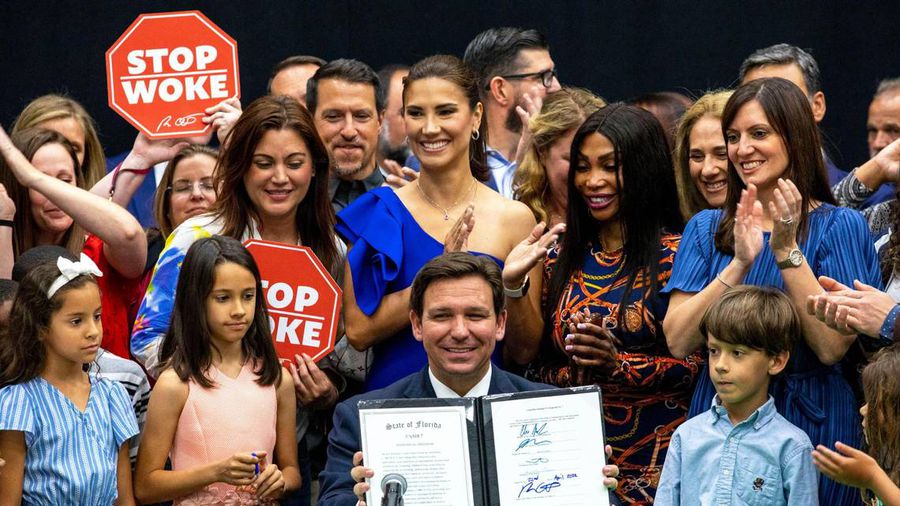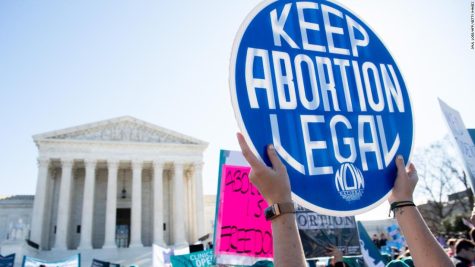NEWS ANALYSIS: Gov. DeSantis’ “Stop WOKE Act” handcuffs teacher-led discussion of sensitive topics
Florida governor Ron DeSantis, with school children as backdrop props, displays the Florida bill known as the “Stop WOKE Act” he signed into law on April 22. The law went into effect on July 1.
Florida teachers are seeing the impact of the “Stop WOKE Act” on their curricula as the new school year kicks off. The legislation, signed into law by Republican Gov. Ron DeSantis, went into effect on July 1 after the Florida legislature passed it in March. “Stop WOKE” is a part of the conservative initiative to control discussions of race and other issues deemed sensitive in the classroom.
The “Stop the Wrongs to Our Kids and Employees Act,” better known as the “Stop WOKE Act,” places restrictions on the ability of schools and workplaces to introduce honest discussions of race to students and employees. Parents and employees are able to sue institutions that they consider in violation of the act. It has added to the ongoing conservative stance against “critical race theory,” which works to educate on the role of race and racism in the shaping of society.
However, the “Stop WOKE Act” does not just censor discussions of racism. It also sensors issues related to gender and sexual orientation. Many subjects related to history, social studies, and the humanities also “might fall into the state’s list of dangerous ‘concepts,” English professor at Florida State University Diane Roberts explained in The Washington Post.
Olympic Heights English teacher Ms. DeAnna Allen is wary of the exclusion of these conversations from classrooms. “Do I believe teachers should be inappropriately talking about sex, race, gender, etc.? No, I don’t,” said Allen. “However, they should be allowed to teach about the mistakes made in the past to make sure the current generation understands and accepts differences—not ignore them.”
Florida colleges and universities also face repercussions for utilizing curricula that violate the “Stop WOKE Act,” with the government threatening to take away millions in state funding or even strip teachers of their jobs if they teach such issues.
Colleges and universities fearful of losing funding have already begun taking controversial acts of caution. For example, the University of Central Florida temporarily removed statements that condemned racism from its websites in an attempt to avoid being stripped of state funding following the initial passage of the act. This “self-censorship” by the university led to immense backlash.
“I don’t like the idea of not being able to talk about these issues in my classes,” said OH senior Audrie Mahoney, who is planning on attending college in-state after graduation. “I am passionate about equal rights and don’t want my education to be watered down.”
Teachers have seen many changes to what they can discuss with their students going forward, primarily in history and English classes. Given the time most history classes dedicated to historical societal advances such as the civil rights and women’s movements, the act has threatened the integrity of the accounts of the groups involved in them for the months upon years in which they are taught.
The act itself partially works to prevent White students from “guilt, anguish, or other forms of psychological distress because of actions, in which the person played no part, committed in the past by other members of the same race, color, national origin, or sex.” In other words, the act aims to avoid blaming White students for the historical oppression of minorities.
However, many opponents of “Stop WOKE” feel this is simply a means of enabling ignorance to White students by declining to acknowledge what Black people and other minorities have undergone.
“We need to continue to advocate for those who have suffered and do suffer,” said Ms. Barbara Bloom, an English teacher at Eagles Landing Middle School, “not protect the most privileged groups from the discomfort that knowing the truth may bring them.”
English classes have been particularly impacted by the “Stop WOKE Act” in the form of book bans. Fear of parent complaints or even lawsuits has prompted schools to examine course materials with a sharper lens, with some books being barred from allowance in the classroom after review.
Outrage over the book ban laws spiked with the circulation of a “banned books list” on Twitter, which included classics such as To Kill a Mockingbird, The Catcher in the Rye, and even the entire Harry Potter series.
One book on the list that hit close to home for many students at OH is The Outsiders, which some students recall reading in eighth grade with teachers such as Bloom. “It’s a sad sign of the times when a book that openly addresses broken homes, child abuse, class distinction and its impact on teenagers’ self-esteem, and a myriad of social and emotional issues is considered off-limits by politicians who are blatantly pandering to their base in order to get elected,” Bloom commented.
Luckily for Bloom and other teachers of the books on the list, the “banned books list” turned out to be fake. No books have been banned at the state level; however, books are able to be banned within school districts. Regardless, it was an eye-opener for opponents of the act who value the themes of the books on the list that are deemed controversial.
“I have read several pieces of text that can be considered ‘offensive’ to a Black audience, a Jewish audience, a Hispanic audience, etc.,” explained Allen. “However, those same offensive pieces teach my students what not to do. They teach them to be better human beings.”
The “Stop WOKE Act” is just one part of the governor’s slew of laws that impact Florida’s educational system. Over the past year, the governor has shown his support for the races of 29 candidates in various school board races across the state, politicizing the education system like never before.
The school board elections in Sarasota County proved to be a primary example of this. Candidate Bridget Ziegler was endorsed by the governor and, in turn, supported him in his political endeavors, even appearing on Fox News on his behalf. “I don’t want my children and their peers to learn to hate America through the anti-American curriculum that we continue to see,” she said in support of “Stop WOKE.”
On the other hand, DeSantis bashed candidates for school board positions who did not align with his Republican, “parental rights” agenda. One candidate in Sarasota who was Democratically endorsed was attacked by advertisements calling her “woke,” according to Rolling Stone. Some even called her a “baby killer,” as she previously worked for Planned Parenthood.
DeSantis has made “parental rights” the basis of his platform over the past few years, with a series of legislations giving parents, particularly conservative parents, more power over what is taught in the classroom. In addition to the ability to sue schools that violate the “Stop WOKE Act”, DeSantis also gave parents more power with the ban on mask mandates and with the “Don’t Say Gay” act.
His opponents have denounced DeSantis for placing his political agenda over the good of Floridians. Running for reelection in the 2022 midterm elections and strategizing for a potential 2024 presidential campaign, DeSantis has secured his large conservative following at the expense of the education and awareness of future generations.
“I think it’s a problem when politicians of any kind use unnecessary laws to promote their political campaigns,” said OH senior Sami Levick. “As somebody who will have the opportunity to vote for the first time this November, I know that DeSantis’ decision to implement the act has made my decision of who I will be voting for an easier one to check off on the ballot.”
Unfortunately for DeSantis, Florida judge Mark Walker recently ruled the workplace provision of the “Stop WOKE Act” to be unconstitutional. NBC reported that he wrote that “the law, as applied to diversity, inclusion, and bias training in businesses, turns the First Amendment ‘upside down’ because the state is barring speech by prohibiting discussion of certain concepts.”
Conservatives in support of DeSantis’ educational and political agenda will continue to support laws such as the “Stop WOKE Act,” but Walker’s ruling on free speech in the workplace is a glimmer of hope for those who aspire to see further rulings challenging the removal of free speech from classrooms.











